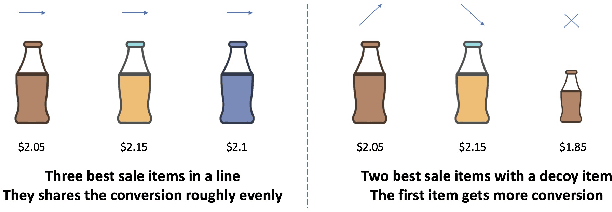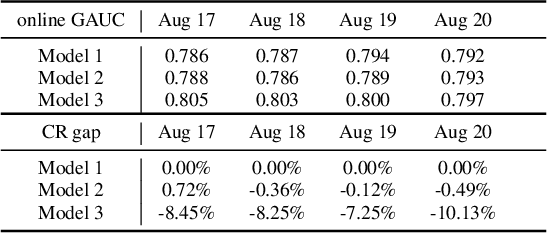Yongqing Gao
Imitate TheWorld: A Search Engine Simulation Platform
Aug 10, 2021



Abstract:Recent E-commerce applications benefit from the growth of deep learning techniques. However, we notice that many works attempt to maximize business objectives by closely matching offline labels which follow the supervised learning paradigm. This results in models obtain high offline performance in terms of Area Under Curve (AUC) and Normalized Discounted Cumulative Gain (NDCG), but cannot consistently increase the revenue metrics such as purchases amount of users. Towards the issues, we build a simulated search engine AESim that can properly give feedback by a well-trained discriminator for generated pages, as a dynamic dataset. Different from previous simulation platforms which lose connection with the real world, ours depends on the real data in AliExpress Search: we use adversarial learning to generate virtual users and use Generative Adversarial Imitation Learning (GAIL) to capture behavior patterns of users. Our experiments also show AESim can better reflect the online performance of ranking models than classic ranking metrics, implying AESim can play a surrogate of AliExpress Search and evaluate models without going online.
Validation Set Evaluation can be Wrong: An Evaluator-Generator Approach for Maximizing Online Performance of Ranking in E-commerce
Mar 27, 2020



Abstract:Learning-to-rank (LTR) has become a key technology in E-commerce applications. Previous LTR approaches followed the supervised learning paradigm so that learned models should match the labeled data point-wisely or pair-wisely. However, we have noticed that global context information, including the total order of items in the displayed webpage, can play an important role in interactions with the customers. Therefore, to approach the best global ordering, the exploration in a large combinatorial space of items is necessary, which requires evaluating orders that may not appear in the labeled data. In this scenario, we first show that the classical data-based metrics can be inconsistent with online performance, or even misleading. We then propose to learn an evaluator and search the best model guided by the evaluator, which forms the evaluator-generator framework for training the group-wise LTR model. The evaluator is learned from the labeled data, and is enhanced by incorporating the order context information. The generator is trained with the supervision of the evaluator by reinforcement learning to generate the best order in the combinatorial space. Our experiments in one of the world's largest retail platforms disclose that the learned evaluator is a much better indicator than classical data-based metrics. Moreover, our LTR model achieves a significant improvement ($\textgreater2\%$) from the current industrial-level pair-wise models in terms of both Conversion Rate (CR) and Gross Merchandise Volume (GMV) in online A/B tests.
 Add to Chrome
Add to Chrome Add to Firefox
Add to Firefox Add to Edge
Add to Edge